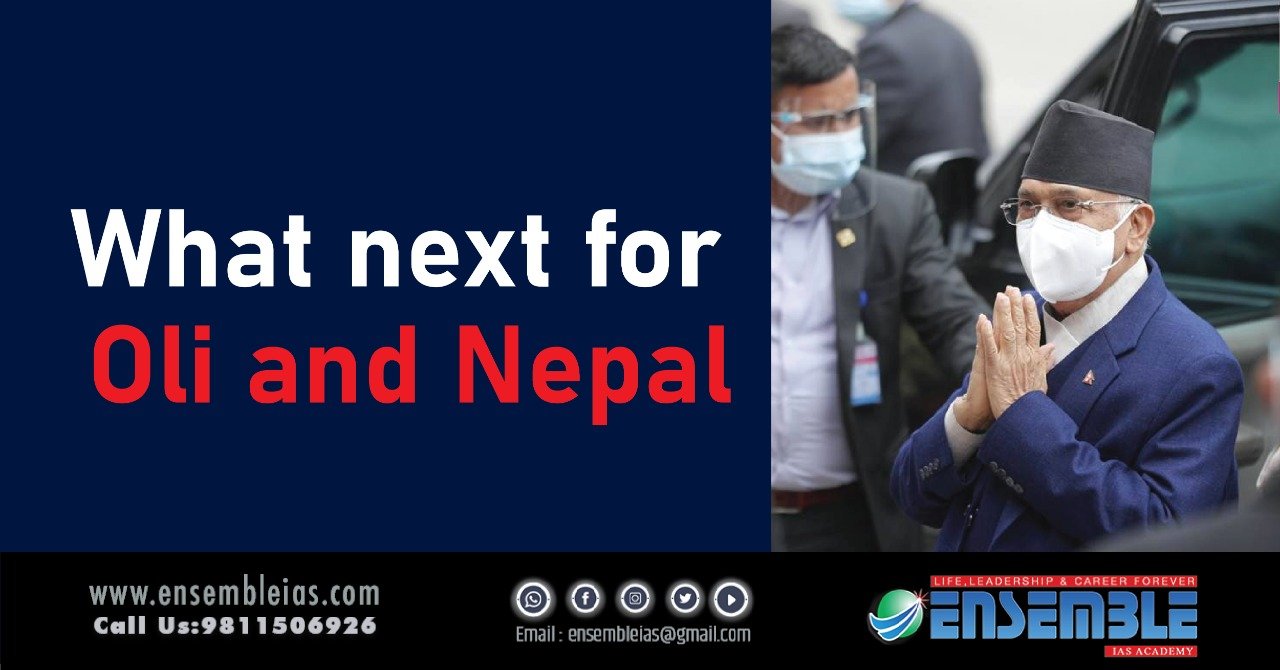Explained: What next for K P Oli and Nepal: Prime Minister Oli has lost a vote of confidence in Nepal’s Parliament. A look at what Nepal’s Constitution prescribes in such a situation, who all are for and against Oli, and how the situation may unfold from here.
To buy our online courses: Click Here
On Monday, Nepal Prime Minister K P Oli lost a vote of confidence in Parliament, leaving the country’s politics in uncertainty.
Oli, chairman of the Nepal Communist Party-Unified Marxist-Leninist, had come to power for the second time in 2018, in the first ever parliamentary polls under the new Constitution promulgated in September 2015.
Two factors helped boost his image. He had stood up to India when it launched an economic blockade after the Constitution was promulgated, and expressed unhappiness over grievances of the people of the Terai not being addressed. Second, the Nepal Communist Party–Maoist Centre aligned with Oli’s party during the elections, and subsequently merged to form the Nepal Communist Party.
His image took a blow at the end of the first half of his five-year tenure in September last year. His refusal to vacate his seat, as agreed, in favour of Pushpa Kamal Dahal Prachanda, Co-Chairman of the Nepal Communist Party, eventually proved his undoing.
The vote
In the vote of confidence, 93 members supported Oli and 124 opposed him, while 28 from his own party — including former Prime Ministers Jhalnath Khanal and Madhav Nepal — abstained in efiance of the party whip, and 15 others remained neutral. Counting a few members who were absent on Monday, the House has an effective strength of 267; to become PM, anyone will need at least 134 votes.
President Bidhya Devi Bhandari has asked parties to stake their claim by Thursday night. Article 76(2) of the Constitution requires a leader to furnish proof of majority support in the House, and then prove it on the floor within a month. If no claim is made by the Thursday night deadline, it will result in the President invoking Article 76(3), which would mean the leader of the largest party in the House — in this case Oli himself — would have to be invited to form the government, and proving his majority within 30 days. Oli is unlikely to step aside and pave the way for someone else.
Rival turned supporter
When his own comrades deserted him, Oli found unlikely support from Mahanth Thakur, First Chairman of the Janata Samajbadi Party with 32 members in Parliament. He stayed neutral along with 14 members while 15 others voted against Oli. Thakur and his group are contemplating action against Upendra Yadav, leader of the other faction.
Thakur and other Terai-based political groupings had owned the blame for blocking the border after promulgation of the Constitution in a bid to absolve India, amid rising anti-India sentiment in Nepal. More than 60 people protesting against the Constitution had lost their lives and India had raised the issue in the UN Human Rights Council. Thakur and his party had then declared Oli the biggest enemy of the people of Terai.
But in the new bond with Oli, Thakur seems not to be bothered about the likely split in his party as half the members are in favour of supporting Nepali Congress leader Sher Bahadur Deuba as the new Prime Minister. Deuba has been promised support by the Nepal Communist Party—Maoist Centre that has 48 members (plus the Speaker).
Also Read: India’s real foreign policy crisis is domestic
Dissidents’ next move
Dissidents like Khanal and Nepal can play a decisive role or totally disappear from the political scene now. While their abstention brought Oli down, whether they would resign from the House or wait for Oli to suspend or terminate their membership will be decisive in choosing the next leader. If they resign, the effective strength of the House will come down to 239, making it easy for Deuba to win with 124 votes. If they wait for Oli to act, it will favour the person they wanted to finish politically. If Oli does not terminate their membership before the floor test, Deuba would need at least 134 seats — which looks impossible as of now.





